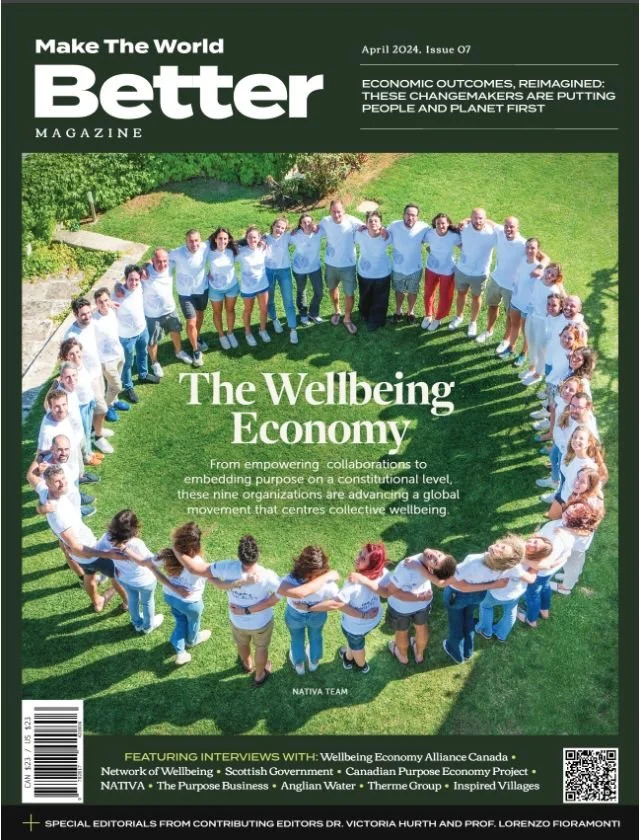Why Millennials expect much more from businesses in 2021
Pressures on businesses to act responsibly are reaching an all-time high and it’s coming from the next generation taking over. See what our Millennial advisors on the team demand businesses to focus for 2021 and the years to come.
In a world where trust is the new currency, businesses are under immense pressure to get it right. More than ever, they are called upon as critical players to address complex and critical issues that were only magnified in the last year. Businesses are expected to find innovative, inclusive and lasting solutions that tackle them at their roots.
Part of the reason? Mounting pressure to act from Millennials - something now reaching a tipping point. By 2025, Millennials will comprise 75% of the global workforce. Forecasted to inherit $30 trillion in wealth over the next two decades, Millennials are twice as likely to invest in companies targeting social or environmental goals. Without a doubt their voices hold weight and power. To get a first-hand look at how this translates, I interviewed TPB’s Millennial advisors – Carissa Pobre based in Manila and Rebecca Walker Chan, Tiffany Lee and Diana Chen from Hong Kong - on what businesses need to address to survive in 2021.
Climate change is real, with the gavel coming down hard on decarbonisation
In 2021, businesses in Asia need to take ownership of their climate risks and get proactive in developing a decarbonisation strategy.
Rebecca Walker Chan warns Asian businesses, reminding them that:
“With less than a decade left to limit global warming to 1.5°C, the region is lagging and businesses will bear the brunt more than they may realise. Businesses have a role to play in divesting from fossil fuels, placing more resources in renewables and clean technology.”
With about 70% of the global population projected to live in cities by 2050, golden opportunities await the transportation sector for low carbon urban mobility - a bicycle boom in congested areas, an influx of electric vehicles and better public transport to maximise connectivity. Now that HKEX's updated reporting requirements includes climate risk management - and financial institutions like BlackRock call for companies to transition to a net zero world - businesses are finally starting to pay attention to the bigger picture of climate-related risks.
To prove the point, Diana Chen tells us:
“Considering the waterfall of carbon neutrality commitments in Asia Pacific last year, companies are feeling the pressure to decarbonise their operations. We’ve seen several clients ask about the journey toward net zero and have increased interest in climate-focused reporting frameworks such as TCFD.”
For some clients starting from ground zero, net zero seems like Mt. Everest. At the very least, a company taking on this mountain must have a good understanding of the current resources they use – things like energy, water and waste. For a company to own their contribution to a net zero world requires evidence-based and data-driven action. It begins with understanding their environmental footprint by assessing where and how energy, water and waste is generated and used throughout the business.
Another key to business survival? Building a more resilient workforce, focusing on employee wellbeing, supply chain resilience and diversity and inclusion
Whether it was employees, business partners, customers or the community, the pandemic has undoubtedly shed light on the 'social' in ESG. Companies will inevitably focus on COVID recovery and operating with better risk preparedness, but a crucial part of that includes rethinking their approach to social issues.
Workforce solidarity spans not only physical health and safety, but also acting to improve the well-being and mental health of employees. Cisco’s Chief People Officer shared their holistic employee strategy on a recent interview, as the company secured Top position in Fortune’s World’s Best Workplaces 2020 for the second consecutive year. She says, “We know that if we take care of our people, they're going to take care of the business.” The company amplified their people-centred culture in the last year – addressing staff anxiety levels with company-wide day-offs, cultivating empathetic leaders and continuing their Cisco Mind Set programme to focus on resilience building.
With rising consumer activism and international organisations clamouring for decent working conditions and equitable living wages, businesses must consider expanding their scope of care to players along the supply chain. This means developing a robust engagement plan to strengthen relationships with suppliers and other industry players. Companies need more data availability and transparency to diagnose disproportionate wage levels and address incidents of forced labour and corruption. It’s also important for companies to build long-term supplier relationships to understand how they can provide more sustainable purchasing practices so that workers are compensated fairly and consistently. And finally, collective power is more impactful than individual effort. Companies should look to bring other key industry players on board to lobby for improved legislation around human rights due diligence.
In terms of diversity and inclusion (D&I), Tiffany Lee brought up the eruption of social movements like Black Lives Matter in the US and the rampant marginalisation of minority groups following the pandemic:
“COVID-19 has further revealed deep societal inequalities. Companies are starting to view D&I in a new light – one that sees the diversity of their workforce and an inclusive culture as critical to business survival.”
However, in Asia, that business case is not well enough understood. Companies are still trying to define what D&I means to them and how it adds value to their business. They are not yet at the mindset that D&I is a key ingredient to business innovation and thus necessary for business continuity. It's clear that those that do recognise this in 2021 will pull ahead.
Leadership will be scrutinised
The Millennial generation is one that looks for meaningful work aligned with their values. Deloitte's 2020 Global Millennial Survey revealed that in response to the pandemic, Millennials feel that companies have done more to meet their expectations of creating diverse and inclusive workplaces, positively impacting communities and reducing their environmental footprint. However, only 51% of Millennials see businesses as a force for good, down from 76% in 2017, suggesting that business leaders need to do more. A few constructive actions taken during the crisis should be seen as a foundation upon which more goodwill can be built, but they're not enough. In the same survey, we see that the reputations of business leaders lag, with only a third of respondents saying business leaders are having a positive impact on them.
While Millennials eagerly wait their turn to be the sage leaders of the world, they will be evaluating whether or not their current leaders are truly committed to building a responsible business. Ultimately they will be continuously evaluating how purpose shows up in their daily work. Our Millennials here at TPB believe that companies whose purpose it is to address the welfare of society are best fit to lead new ventures and build a more resilient future.
But they can’t do it alone – it will take humility from business and government leaders and a collaborative effort to find common ground with different stakeholders to steer towards a shared goal.
Carissa Pobre puts it this way, calling leaders to respond to communities impacted by their business:
“After the events of 2020, consumer and employee activism have become emboldened - and rightly so. Regardless of industry, business leaders need to listen to what all stakeholders have to say - and engage authentically.”
Companies with strong leadership and accountable governance on environmental and social issues are set to weather the storm best. These were the same companies who were lean and agile enough to quickly adapt to the pandemic. We are only seeing the beginning of future disruptions - but it's those businesses grounded by a clear purpose that will best navigate the ongoing uncertainty.




